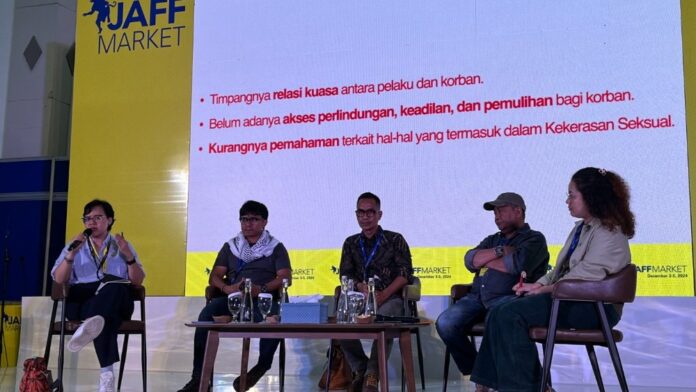Indonesian filmmakers have raised concerns regarding workplace safety for production crew on the opening panel at the inaugural JAFF Market, running Dec. 3-5 alongside the Jogja-Netpac Asian Film Festival (JAFF).
Ensuring the safety and health of crew members should always be the priority for any sectors of work, but especially in Indonesia, the panelists said. Back in August of this year, a production crew member in Indonesia had a fatal accident on his way home after staying awake to work on set for extreme hours. Though it wasn’t the first time it had happened, it was a wake up call for creative workers all across the country.
Indonesian cinematographer Muhammad Firdaus (“Nearing Death”) urged attention to safety as a means of prevention in the panel. “Realistically, film production is [physically] very high risk for everyone involved,” he said. The bureaucracy of Indonesian law classifies film production as a low risk business activity under Law no 11 in Indonesia’s Job Creation Act of 2020. “On paper, film [production] is ill-fated here. For [production crews] to still live today is a miracle.”
Mandy Marahimin, head of human resource development at the Indonesian Film Producer Association (APROFI) and producer behind Toronto, Busan and London title “Crocodile Tears,” which is also playing at JAFF, highlighted the significance of managing safety measures on sexual violence prevention, which can often happen on set.
“All producers are required to educate their crews using the provided guide,” Marahimin said. “The range of what qualifies as sexual violence varies, and many aren’t aware or even understand how it’s defined.”
Especially with intimate scenes, Marahimin advocated the gravity of everyone’s safety and mental health condition in production. Intimacy coordinators are very new to Indonesian productions with only two Intimacy Professionals Association-certified members working in the country.
Despite having laws regarding the workplace already implemented since the 1970s in Indonesia, it was never focused on creative sectors – such as film production. There’s still much the Indonesian film industry can learn from Hollywood in its safety and union practices, according to Ikhsan Raharjo, Al Jazeera News producer and chair of SINDIKASI, the Indonesian media and creative worker’s union.
In a study done by SINDIKASI and Indonesian Cinematographers Society (ICS) in 2022, over 50% of respondents stated their average working hours in a single shoot day are 16-20 hours. Such workloads have serious health risks which could result in fatality, the panelists agreed.
“Everyone in the Indonesian film ecosystem is responsible for each other’s safety and health, actually. We’re all integrated in this [realm], and we should keep each other safe,” said Raharjo. “We have to move fast, to get on board [for workplace safety regulation] as Indonesian cinema rises.”

